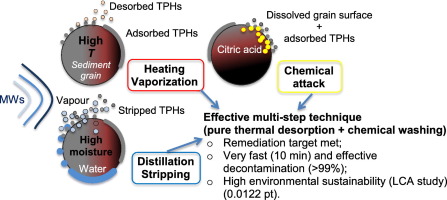Science of the Total Environment ( IF 8.2 ) Pub Date : 2017-11-13 , DOI: 10.1016/j.scitotenv.2017.11.085 Pietro P. Falciglia , Carlo Ingrao , Guido De Guidi , Alfio Catalfo , Guglielmo Finocchiaro , Marcello Farina , Maria Liali , Giuseppe Lorenzano , Gaetano Valastro , Federico G.A. Vagliasindi

|
The potential ability of microwave heating (MWH) for the remediation of marine sediments affected by severe hydrocarbon (HC) contamination was investigated. Decontamination effectiveness and environmental sustainability through a comparative Life Cycle Assessment (LCA) were addressed. Main results revealed that the application of a 650-W MWH treatment resulted in a rapid (15 min) HC removal. A citric acid (CA) dose of 0.1 M led to enhanced-HC removals of 76.9, 96.5 and 99.7% after 5, 10 and 15 min of MW irradiation, respectively. The increase in CA dose to 0.2 M resulted in a shorter successful remediation time of 10 min. The exponential kinetic model adopted showed a good correlation with the experimental data with R2 values in the 0.913–0.987 range. The nature of the MW treatment was shown to differently influence the HC fraction concentration after the irradiation process. Achieved HC removals in such a short remediation time are hardly possible by other clean-up techniques, making the studied treatment a potential excellent choice. Removal mechanisms, which allowed the enhanced-MWH to operate as a highly effective multi-step technique (pure thermal desorption + chemical washing), undoubtedly represent a key factor in the whole remediation process. The LCA highlighted that the MW technology is the most environmentally sustainable alternative for sediment decontamination applications, with a total damage, which was 75.74% lower than that associated with the EK (0.0503 pt).
中文翻译:

柠檬酸增强微波加热对海洋沉积物净化的环境生命周期评估
研究了微波加热(MWH)修复受严重碳氢化合物(HC)污染影响的海洋沉积物的潜在能力。通过比较生命周期评估(LCA)解决了净化效果和环境可持续性问题。主要结果表明,650 W MWH处理的应用导致了HC的快速去除(15分钟)。柠檬酸(CA)剂量为0.1 M,分别在MW照射5、10和15分钟后,HC去除率分别提高了76.9、96.5和99.7%。CA剂量增加至0.2 M导致成功修复的时间缩短了10分钟。所采用的指数动力学模型与R 2的实验数据显示出良好的相关性值在0.913–0.987范围内。结果表明,微波处理的性质会不同程度地影响辐照过程后的HC馏分浓度。在短短的修复时间内很难通过其他净化技术实现HC去除,这使得研究的治疗成为潜在的极佳选择。去除机制使增强的MWH可以作为高效的多步技术(纯热脱附+化学洗涤)运行,无疑代表了整个修复过程的关键因素。LCA强调,兆瓦技术是沉积物去污应用中对环境最可持续的替代方案,其总破坏率比EK(0.0503 pt)低75.74%。











































 京公网安备 11010802027423号
京公网安备 11010802027423号